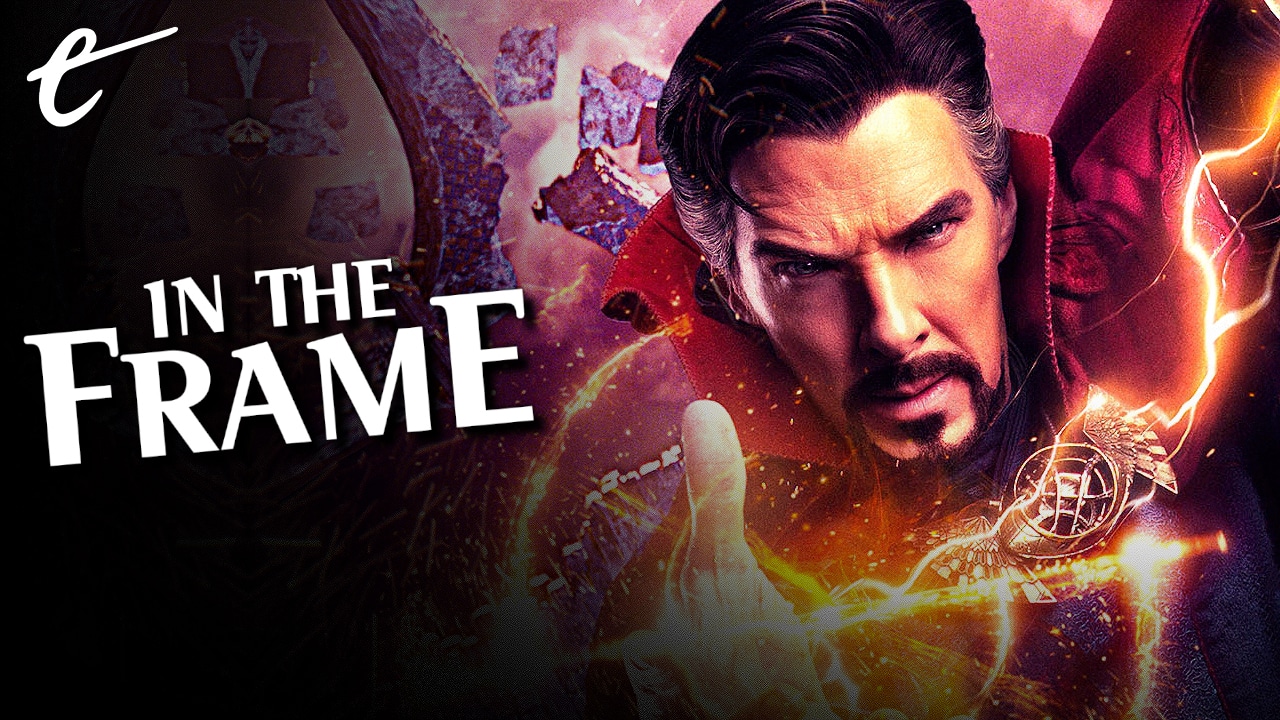
Multiverse of Madness Has to Save the MCU, at the Box Office & Culturally
There is a surprising amount riding on the sequel to Doctor Strange, Doctor Strange in the Multiverse of Madness.
Scott Derrickson’s Doctor Strange is a solid movie. There’s quite a lot to recommend it as an example of the factory default. It is similar to Kenneth Branagh’s Thor, in that it is a well-constructed superhero movie that works in large part because it pitches itself at precisely the right level for the studio machinery around it. It’s a good time at the movies, and there is nothing wrong with that. However, there was never a sense that Doctor Strange was a crucial movie for Marvel Studios.
This was reflected in the movie’s reception. Doctor Strange earned $232 million at the domestic box office and $677 million worldwide. The only Phase 3 movie to earn less was Ant-Man and the Wasp. The reviews for the movie were solid, if unremarkable. The movie sits comfortably in the middle of the Marvel Cinematic Universe (MCU) as ranked by Rotten Tomatoes and just at the edge of the studio’s top 10 on Metacritic.
This is a good showing, but it’s a less important movie to the Marvel Studios brand than many of the films around it. It lacks the scale (and box office impact) of the event films like Captain America: Civil War, Avengers: Infinity War, and Avengers: Endgame. It lacks the cultural significance and impact of films like Black Panther and Captain Marvel. It even lacks the same importance to the studio as Spider-Man: Homecoming, which brought a beloved character into the company’s universe.
With this in mind, there is a lot riding on Doctor Strange in the Multiverse of Madness. It is clear that Marvel Studios has a lot invested in Multiverse of Madness. Star Benedict Cumberbatch promised Empire that it would measure up to Spider-Man: No Way Home: “It’s a big, big movie. It’s going to be an absolute riot. And if it brings off the level of ambition it’s got, we’re going to have a success on the level of Spidey. There you go, I’ll put my flag in the sand.”

Multiverse of Madness is a sequel to a modestly performing superhero movie starring a character who, to that point, had been somewhat niche. No Way Home is the sixth highest-grossing movie of all time, starring one of the most recognizable characters in the world whose solo franchise movies had already grossed over $6 billion worldwide before No Way Home is factored into the calculations. That’s a lot of weight to place on a marginal player in the larger franchise.
Of course, Multiverse of Madness is not banking solo on Doctor Strange (Cumberbatch). The film promises to be a cavalcade of cameos from various other comic book movie franchises, with familiar faces crossing the multiverse. The first trailer suggested that Patrick Stewart will reprise his role as Professor Charles Xavier from the X-Men movies. There are rumors of appearances from characters like Nicolas Cage’s Ghost Rider, Wesley Snipes’ Blade, and Ryan Reynolds’ Deadpool.
There are suggestions that Marvel Studios is particularly anxious about Doctor Strange in the Multiverse of Madness. According to the writer of the original film, C. Robert Cargill, Derrickson departed the project because he “wanted to do one movie, and Marvel wanted to do another movie.” Marvel responded to Derrickson’s departure by recruiting Sam Raimi, whose last film was Oz: The Great and Powerful for Disney in 2013 and whose last superhero movie was stuffed with studio-appeasing cameos.
Disney has cleared the runway for Multiverse of Madness. The streaming show Moon Knight will wrap up on May 4, two days before the release of Multiverse of Madness. It is perhaps notable that Obi-Wan Kenobi premieres on May 27 rather than May 4. There has been minimal promotion of Thor: Love and Thunder, the movie following Multiverse of Madness, to the point that it has the studio’s shortest window between trailer premiere and movie release since The Incredible Hulk.

So why are Disney and Marvel Studios so anxious about Multiverse of Madness, particularly given the fact that the MCU is the most successful movie franchise in history? Marvel Studios was a huge part of Disney’s record-breaking and blockbusting 2019, where the studio made more money in a single year than any studio ever, commanding 33% of the market. That was only three years ago, and two of those years have been spent in an unprecedented global pandemic.
The Marvel brand has continued to perform exceptionally. The pandemic may even have accelerated the company’s expansion into television. Streaming metrics are obviously opaque, but various sources suggest that shows like WandaVision and The Falcon and the Winter Soldier performed well with viewers and helped drive subscribers to Disney+. WandaVision even picked up the studio’s first Emmy nominations, which seems important given debates about No Way Home at the Oscars.
However, Marvel Studios does face some challenges going forward. In some ways, the pandemic was advantageous for the company’s brand. Disney was always going to have a relatively underwhelming 2020 compared to the success of 2019. Endgame was the culmination of a decade-long story and also a potential jumping-off point for fans who had grown up with the MCU. So the company needed something that could potentially compete with Endgame to at least retain audience interest.
Marvel Studios’ theatrical releases have performed reasonably well in the context of the pandemic, but not exceptionally so. Black Window earned $379 million worldwide. Shang-Chi and the Legend of the Ten Rings earned $432 million worldwide. Eternals returned $402 million worldwide. Theoretically, making any money in the middle of a global pandemic should be enough to satisfy stakeholders, but there was still a perception that the company’s brand was damaged.

Black Widow released in July but earned appreciably less than the $468 million grossed by the similarly digital day-and-date Godzilla vs. Kong in March or the $726 million grossed by the theatrically exclusive F9: The Fast Saga in June. Shang-Chi and the Ten Rings released in September but earned appreciably less than the $502 million grossed by Venom: Let There Be Carnage just a few weeks later. Eternals earned just over half of the $774 million total of No Time To Die, released a month earlier.
Again, it is easy to overstate the importance of these metrics in the midst of a global crisis on the scale of the COVID-19 pandemic. However, perception is important in the movie industry, and the box office narrative that formed around Eternals was one of failure and disappointment. More than that, Eternals received the worst critical reaction of any film in the shared universe, suggesting that the company’s brand had perhaps been tarnished in a less tangible way.
The challenge facing Marvel Studios is the sense that the theatrical market is slowly and steadily returning to normal. Sony proved that it was possible for a comic book movie to make significant bank in the middle of a variant surge, with Spider-Man: No Way Home earning $1.8 billion at the global box office. More than that, The Batman is a three-hour-long dark-and-gritty stylish solo superhero reboot without a shared universe to support it, likely ending up at around $800 million.
These are the stakes for Doctor Strange in the Multiverse of Madness. Marvel Studios essentially need to reassert its dominance, both culturally and financially. Multiverse of Madness represents an opportunity for Marvel to prove that it still sets the rules in terms of the superhero genre and even the global box office, that the bloom has not come off the rose after Infinity War and Endgame, and that it can still give audiences exactly what they want better than its competitors at Sony or Warner.

It would be foolish to bet against Marvel Studios. The company has succeeded in much starker circumstances, turning unfamiliar properties like Guardians of the Galaxy into globally recognized brands. More than that, Multiverse of Madness is making a clear play for the nostalgia of an audience that might be aging out of superhero films, bringing back returning characters from decades-old franchises. Nostalgia sells — just look at No Way Home or Ghostbusters: Afterlife.
This may be reason to be wary of Multiverse of Madness. With so much riding on the film’s success, and much of the film’s success determined by its effectiveness as a fan service delivery mechanism, it’s interesting to wonder whether the modest charm of the original will be lost. Sam Raimi is a hugely talented director who is often overlooked as the godfather of modern superhero cinema, but the last time he made a superhero film with this much riding on it, the result was Spider-Man 3.
It seems assured that Doctor Strange in the Multiverse of Madness will work its magic at the box office, but the question remains whether its enchantment will extend beyond necromancy.
